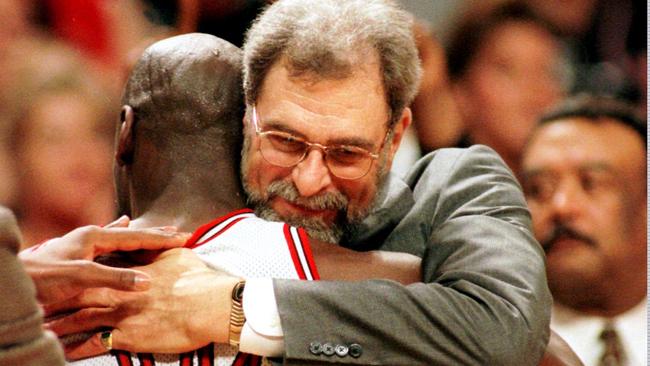The Last Dance: It’s all about the coach
New documentary The Last Dance celebrates Michael Jordan, but it was Zen master Phil Jackson who turned him into a winner.

It’s easy to think of the 1990s Chicago Bulls in terms of one man. The greatest athlete of the modern era whose shaved head, No 23 singlet and custom-designed sneakers became embedded into pop culture. A man who stole ownership of the name Michael from the guy who had moonwalked his way through the ’80s.
Michael Jordan literally and figuratively flew higher than anyone else who dared step on to the same basketball court to challenge him.
Anyone who has come to doubt his place in history at the very top since the ascension of LeBron James has been swiftly reminded otherwise in recent weeks.
But there’s another powerful figure who has been left in the jet-wash of His Airness — Bulls head coach Phil Jackson, the Zen master who found a way to pull together Jordan’s talented yet underachieving team and turn them into the greatest sporting dynasty of the past 30 years.
In lieu of any live action, Australians have been glued to their screens every Monday night as Netflix releases another two episodes in its 10-part documentary series, The Last Dance. And while most are tuning in to relive Jordan’s gravity-defying skills — or learn about them for the first time, depending on how old you are — Jackson’s revolutionary leadership and man-management skills shine through beyond the dunks and the dribbling.
“I never felt like Phil got enough credit when it was happening because of Michael’s presence,” Golden State Warriors coach Steve Kerr told The New York Times recently.
Kerr, who played under Jackson for 3½ seasons in that great Chicago side, makes regular appearances in The Last Dance, helping chronicle the Bulls’ transformation from a “travelling cocaine circus” to six-time NBA champions.
“I think people always underestimated Phil’s talent as a coach, but he was so brilliant and so unique in his style,” Kerr says. “With all the fame and notoriety that surrounded the team and Michael in particular, Phil was just an incredible leader and coach. Very few, if any, people would have had the right skill set and temperament to keep a team like that together and moving forward.”
Star player
Jackson was a star player for the New York Knicks in the 60s and 70s, with shoulders so square he looked as if the world’s biggest coathanger were permanently stuck in his equally huge tracksuits.
He was a fiery scrapper on the court but embraced the hippie sensibilities of the time: he is possibly the only man to have won NBA titles as a player and a coach who also dropped acid — although not at the same time.
The Last Dance tells of the now 74-year-old’s upbringing in rural Montana, the son of two Assemblies of God ministers who had a strong belief in the second coming of Christ.
“So that was always strong in your mind as a kid: ‘would you be ready, if Christ came?” Jackson says in episode four of the documentary.
When his saviour came, he was wearing baggy shorts and sneakers. And Jackson was ready.
As a child Jackson played with the Native American children from a nearby reservation. What he learned from their culture had a strong influence on his coaching and his philosophies of how to manage men.
He came to embrace Eastern religions and alternative philosophies, including burning sage in the locker rooms to drive away bad vibes. The Last Dance shows him leading the Bulls in an on-court therapy session: team members breathe in unison as they peel off their high-tops to feel the pine floor beneath their bare feet.
“I discovered that when I had the players sit in silence, breathing together in synch, it helped align them on a non-verbal level far more effectively than words,” Jackson wrote in his 2014 book Eleven Rings.
The book lists 11 principles of mindful leadership and he needed to draw on all of them in the Bulls’ 1997-98 season — the year Chicago attempted to win its sixth title in eight years with an eclectic mix of players who had just been told by unpopular Bulls general manager Jerry Krause that their beloved coach would be gone by the next season, whether they defended their title or not.
“As time went by, I discovered that the more I spoke from the heart, the more players could hear me and benefit from what I gleaned,” Jackson wrote as his No 1 principle.
“The more I tried to exert power directly, the less powerful I became. I learned to dial back my ego. Paradoxically, this approach strengthened my effectiveness.”
The Last Dance was the name Jackson gave the 1997-98 season — a unifying label that inspired a group of players who had initially ridden on Jordan’s coat-tails (and fallen short when it mattered) but came to find their own voices.
Most unusual challenge
Jackson’s first task in his early days as head coach was perhaps the toughest — telling Jordan to give up the ball. The coach had come to embrace an attacking strategy invented by his assistant Tex Winter called the triangle offence.
Instead of Jordan taking all the shots, he would have to rely on his teammates in a dynamic system that saw players move the ball quickly between themselves in a shapeshifting three-pronged attack.
“That’s not equal opportunity offence, that’s f. king bullshit,” Jordan says in The Last Dance. “So many times Tex would yell at me, ‘Move the ball, move the ball, there’s no I in team.’ Well there’s an ‘I’ in ‘win’.”
Jackson won the battle when Jordan realised the triangle offence translated into wins for the Bulls. The coach had to cajole underpaid star Scottie Pippen — Robin to Jordan’s Batman, as many have called him — to stick with the program. He did.
The Last Dance reveals Jackson’s most unusual challenge — finding a way to fit Dennis Rodman into his team while letting him express himself. The tattooed outsider who wore wedding dresses to press conferences and married Madonna was a brilliant player but a troubled soul with suicidal tendencies.
“He don’t look at me as a basketball player,” Rodman says of Jackson in the documentary. “He look at me as a great friend.”
Jackson bases much of his decision making on Carlos Castaneda’s The Teachings of Don Juan: “Look at every path closely and deliberately. Try it as many times as you think necessary. Then ask yourself, and yourself alone, one question … Does this path have a heart? If it does, the path is good. It if doesn’t, it is of no use.”
Using his principles to influence the unshakeable Jordan, focus the disaffected Pippen and embrace the troubled Rodman led to six NBA titles. It was an accomplishment so rare that perhaps only one coach could hope to come close to replicating such a feat elsewhere.
It was Jackson himself who arrived in Los Angeles a year later and launched yet another dynasty. Two seasons after his time at the Bulls came to end he added his seventh NBA title as head coach of the LA Lakers. And then four more.
The two stars players who fell under Jackson’s spell and reluctantly learned to play together using Jackson’s triangle offence this time were Shaquille O’Neal and Kobe Bryant. You might have heard of them.
PHIL JACKSON’S GAME PLAN
Here are his 11 principles of mindful leadership from his 2014 book Eleven Rings: The Soul of Success.
1. Lead from the inside out
The more I spoke from the heart, the more players could hear me and benefit from what I gleaned.
2. Bench the ego
The more I tried to exert power directly, the less powerful I became. I learned to dial back my ego.
3. Let each player discover his own destiny
I’ve always been interested in getting players to think for themselves so that they can make difficult decisions in the heat of battle.
4. The road to freedom is a beautiful system
I offered each player a vital role to play as well as a high level of creativity within a clear, well-defined structure.
5. Turn the mundane into the sacred
My job was to make something meaningful out of one of the most mundane activities on the planet …
6. One breath = one mind
When I had the players sit in silence, breathing together in synch, it helped align them on a non-verbal level far more effectively than words.
7. The key to success is compassion
A few kind, thoughtful words can have a strong transformative effect on relationships …
8. Keep your eye on the spirit, not on the scoreboard
Most coaches get tied up in knots worrying about tactics. I preferred to focus my attention on whether the players were moving together in a spirited way.
9. Sometimes you have to pull out the big stick
I want to prepare them for the inevitable chaos that occurs the minute they step on to a basketball court.
10. When in doubt, do nothing
I subscribe to the philosophy of the late Satchel Paige: “Sometimes I sits and thinks, and sometimes I just sits.”
11. Forget the ring
I know that being fixated on winning (or more likely, not losing) is counter-productive, especially when it causes you to lose control of your emotions.
-
Simon McLoughlin is The Australian’s deputy sports editor.

